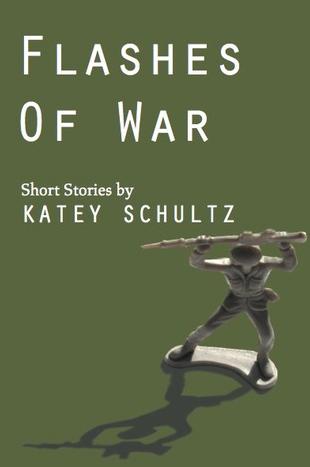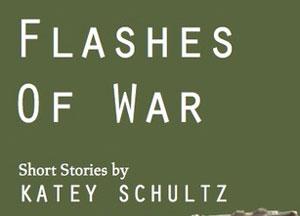 In FLASHES OF WAR, her first book, Katey Schultz , barely bending the boundaries of the exacting subgenre of “flash fiction,” gives us honed-to-the-bone, gut-wrenching glimpses into the lives of soldiers and civilians irreparably damaged and torn apart by the ongoing wars in Iraq and Afghanistan.
In FLASHES OF WAR, her first book, Katey Schultz , barely bending the boundaries of the exacting subgenre of “flash fiction,” gives us honed-to-the-bone, gut-wrenching glimpses into the lives of soldiers and civilians irreparably damaged and torn apart by the ongoing wars in Iraq and Afghanistan.
My unrefined reaction to these largely ultra-short stories written by a young woman with no personal experience of combat or war was a wondering and respectful “Holy crap!” How in the hell did she DO this? How did she get herself so completely inside the heads of these soldiers, using such indisputably genuine GI language and thoughts? And even more amazingly, how did she pull off the same hat trick when it came to the other side? Because yes, there are stories here which are about civilians caught in the middle of these seemingly never-ending horrors. There is the Afghan mother trying to understand the collateral death of her small son in “My Son Wanted a Notebook.” And in “First Commander,” there is the small but savvy Iraqi boy scrambling for scraps in the dust of the Americans who “look so tall and wide that just being next to them feels like resting in the shadow of a cloud.” And the voice of a father trying to protect his family in war-torn Fallujah (“Refugee”),
There are non-combatant casualties from our side too, like Lillis, the grieving single mom in “Getting Perspective” who finally begins to accept her loss –
“But I can tell you my husband died in Iraq and I’ll say it out loud: one, because it’s true, two, because he wouldn’t want me keeping quiet about something that important, and three, because it sounds like the start of whatever happens next.”
In “The Waiting: Part II” home front military spouses arrange their lives to support each other, “Like making sure at 6 o’clock we’re on the phone, so we don’t turn on the television and listen to more of that bad-news-IED-no-further-details kind of talk.” This moving one-page piece evoked echoes of Siobhan Fallon’s fine, interlinked story collection, YOU KNOW WHEN THE MEN ARE GONE, as well as the underrated TV series, “Army Wives.”
But the best stories here, I thought, were those told from the perspective of the soldiers. It’s difficult to pick standout pieces, because they are all excellent. I was especially moved by a few though. “WIA” stands out, as a seriously wounded soldier on a medevac transport plane fears he will die – until the nurses came, who “darted like swallows from cot to cot, a silent gentle army whose only mission was to keep us alive.”
And there is Becca, a Walter Reed patient who has lost an arm, yet banters with a friend who has lost both legs and jokes, “I’ll trade ya injuries.” (“Amputee”) Or Stephanie, who can’t wait to follow her older brother into the service and also ends up muitilated and crippled, her grieving parents at her bedside asking, “What happened? What happened? What happened?” (“Deuce Out”)
In “The Quiet Kind,” the longest of these thirty-one stories, Nathan, trained in close-quarters killing, struggles to reconnect with his wife and small daughter, tortured by nightmares of what he has done, knowing that his “is the quiet kind of PTSD.”
FLASHES OF WAR is simply an outstanding piece of work. I tried to think of comparable books, and, oddly, one that sprang first to mind is a collection of great stories recently published by fifteen veterans of these wars called FIRE AND FORGET. Another is the critically acclaimed novel by Joydeep Roy-Bhattacharya, THE WATCH. The truth is though, this “flash fiction” treatment of the wars of our time is totally unique. A brilliant debut and a marvelous achievement of research and imagination. Highly recommened. Bravo, Katey Schultz!
Flashes of War: Short Stories, by Katey Schultz. Baltimore, MD: Apprentice House/Loyola University Maryland, 2013, 188 pages, $16.95
– Tim Bazzett, author of the Cold War memoir, SOLDIER BOY: AT PLAY IN THE ASA, lives in Reed City, Michigan.
..




Write a Letter to the Editor on this Article
We encourage readers to offer their point of view on this article by submitting the following form. Editing is sometimes necessary and is done at the discretion of the editorial staff.